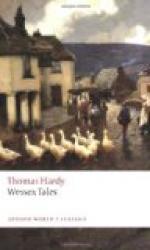We may wonder what were the exact images that passed through his mind during those minutes of gazing upon Lucy Savile’s house, the sparrow, the man and the dog, and Lucy Savile’s house again. There are honest men who will not admit to their thoughts, even as idle hypotheses, views of the future that assume as done a deed which they would recoil from doing; and there are other honest men for whom morality ends at the surface of their own heads, who will deliberate what the first will not so much as suppose. Barnet had a wife whose pretence distracted his home; she now lay as in death; by merely doing nothing—by letting the intelligence which had gone forth to the world lie undisturbed—he would effect such a deliverance for himself as he had never hoped for, and open up an opportunity of which till now he had never dreamed. Whether the conjuncture had arisen through any unscrupulous, ill-considered impulse of Charlson to help out of a strait the friend who was so kind as never to press him for what was due could not be told; there was nothing to prove it; and it was a question which could never be asked. The triangular situation—himself—his wife—Lucy Savile—was the one clear thing.
From Barnet’s actions we may infer that he supposed such and such a result, for a moment, but did not deliberate. He withdrew his hazel eyes from the scene without, calmly turned, rang the bell for assistance, and vigorously exerted himself to learn if life still lingered in that motionless frame. In a short time another surgeon was in attendance; and then Barnet’s surmise proved to be true. The slow life timidly heaved again; but much care and patience were needed to catch and retain it, and a considerable period elapsed before it could be said with certainty that Mrs. Barnet lived. When this was the case, and there was no further room for doubt, Barnet left the chamber. The blue evening smoke from Lucy’s chimney had died down to an imperceptible stream, and as he walked about downstairs he murmured to himself, ’My wife was dead, and she is alive again.’
It was not so with Downe. After three hours’ immersion his wife’s body had been recovered, life, of course, being quite extinct. Barnet on descending, went straight to his friend’s house, and there learned the result. Downe was helpless in his wild grief, occasionally even hysterical. Barnet said little, but finding that some guiding hand was necessary in the sorrow-stricken household, took upon him to supervise and manage till Downe should be in a state of mind to do so for himself.
CHAPTER VI
One September evening, four months later, when Mrs. Barnet was in perfect health, and Mrs. Downe but a weakening memory, an errand-boy paused to rest himself in front of Mr. Barnet’s old house, depositing his basket on one of the window-sills. The street was not yet lighted, but there were lights in the house, and at intervals a flitting shadow fell upon the blind at his elbow. Words also were audible from the same apartment, and they seemed to be those of persons in violent altercation. But the boy could not gather their purport, and he went on his way.




